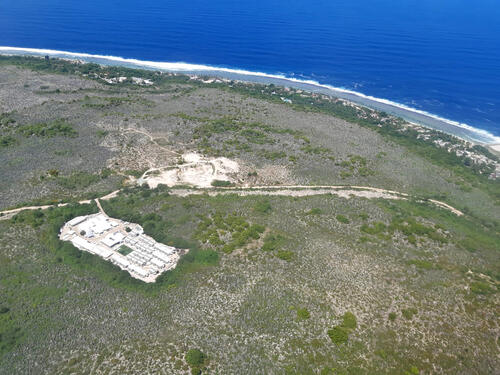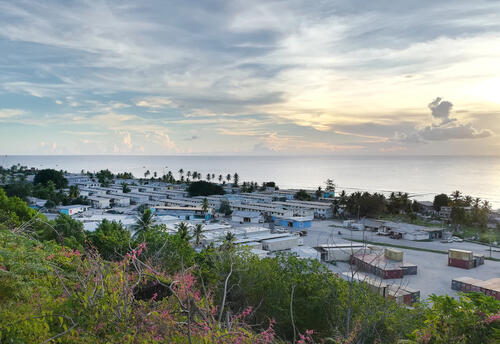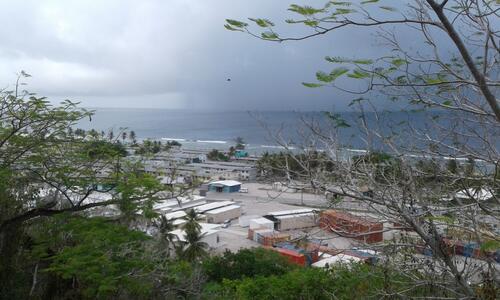Indefinite Despair is based on data collected during our work on Nauru before being forced to end our activities early October. This report shows with figures and medical data the extreme levels of suffering on the island and the impact of Australian policy of offshore processing. MSF was the only independent mental health provider on the island, so this is the only independent analysis of its kind.
Executive summary
Médecins Sans Frontières (MSF) provided mental healthcare on the Pacific island of Nauru for 11 months, before being forced to leave by the Nauruan government in October 2018. This report analyses MSF’s medical data from Nauru, which demonstrates extreme mental health suffering on the island. Close to one-third of MSF’s refugee and asylum seeker patients had attempted suicide, while 12 patients were diagnosed with the rare psychiatric condition of ‘resignation syndrome’. Nauruan nationals also had high levels of severe mental illness; almost half of MSF’s Nauruan patients needed treatment for psychosis.
The data shows that the mental health suffering on Nauru is among the worst MSF has ever seen, including in projects providing care for victims of torture.
MSF calls for an end to Australia’s offshore processing policy and for the immediate evacuation of all refugee and asylum seekers from Nauru – men, women and children. Refugees and asylum seekers must have fast access to permanent resettlement, alongside their families, so that they can begin rebuilding their mental health.
Background information
From November 2017 until October 2018, under an official agreement with the Ministry of Health of Nauru, MSF provided free psychological and psychiatric treatment to Nauruan nationals as well as refugees and asylum seekers sent to the island under the Australian policy of ‘offshore processing’.
As a consequence of this policy, asylum seekers who attempted to reach Australia by boat were sent to remote Pacific islands for an indefinite time period to have their asylum requests processed.
Many of these men, women and children have now spent more than five years on Nauru, with catastrophic effects on their mental health.
On 5 October 2018, the Nauruan government informed MSF, without warning, that our services were “no longer required” and must cease within 24 hours. The cessation of services forced MSF to leave behind hundreds of patients in urgent need of continued mental healthcare.
MSF’s mental health activities
In 11 months of activities:
- MSF provided 285 initial mental health assessments and 1,847 follow-up sessions.
- Of the 285 patients, 73% were refugees or asylum seekers and 22% were Nauruan nationals (the rest were foreign workers or had unknown status).
- 1,526 sessions were conducted for refugees or asylum seekers, 591 sessions for Nauruans, and 4 for foreign workers.
MSF also worked on building local capacity in treating mental health disorders, increasing mental health awareness, and decreasing stigmatisation of mental illness.
Key figures
In 11 months of activities on Nauru...
1,847
1,847
285
285
73 %
73%
MSF’s patients
- Aged from under 1 to 74 years old with an average age of 32.
- 19% of patients were under 18.
- 157 were female and 128 were male.
- Of the refugee and asylum seeker patients, 193 (93%) were recognised refugees while 15 (7%) were asylum seekers.
- Most of the refugee and asylum seeker patients were Iranians (76%), followed by Somalis (5%) and Myanmarese/Rohingyas (3%).
Who were our patients?
19 %
19%
55 %
55%
32
32
Assessing the scale of the mental health crisis
The severity of mental illness among MSF patients was rated using the Global Assessment of Functioning (GAF) scale, which measures the extent to which a patient’s symptoms affect his/her everyday life, ranging from 1 for lowest functioning to 100 for highest functioning. Scores above 70 are considered healthy.
MSF’s patients had very low scores, in both the Nauruan and the refugee and asylum seeker patient groups.
For the Nauruan patients, the median GAF score at initial assessment was 35, reflecting the high rates of untreated psychosis among this group. For the refugees and asylum seekers it was 40. Other MSF projects that treat severe mental health conditions report medians around 60.
The mental health GAF scores of MSF’s refugee and asylum seekers significantly declined in May and June 2018, coinciding with a surge of negative responses to the US resettlement deal, and demonstrating the strong impact of policy decisions on patients’ mental health. No such decrease was observed in Nauruan patients during the same time period.
Refugee and asylum seeker patients
Among the 208 refugees and asylum seekers MSF treated in Nauru, 124 patients (60%) had suicidal thoughts and 63 patients (30%) attempted suicide. Children as young as 9 were found to have suicidal thoughts, committed acts of self-harm or attempted suicide.
Almost two-thirds (62%) of MSF’s 208 refugee and asylum seeker patients were diagnosed with moderate or severe depression. The second highest morbidity was anxiety disorder (25%), followed by post-traumatic stress disorder (18%).
A total of 12 adult and child patients (6%) were diagnosed with resignation syndrome, a rare psychiatric condition where patients enter a comatose state and require medical care to keep them alive.
Devastating impact
The impact of the situation on Nauru on the mental health of our patients was devastating.
60 %
6%
30 %
3%
9
9
62 %
62%
12
12
From war and violence…
MSF’s asylum seeker and refugee patients on Nauru were an extremely vulnerable group; 75% reported experiencing traumatic events in their country of origin and/or during their migration journey, including combat situations and detention. Refugees and asylum seekers who had been detained on Christmas Island during their journey were more likely to attempt suicide than those who had not been detained there.
Despite their experiences en route, it was the indefinite nature of the Australian government policy that was among the main stressors in their lives.
A total of 65% of refugee and asylum seeker patients felt that they had no control over the events in their lives. These patients were significantly more likely to be suicidal or diagnosed with major psychiatric conditions.
…to violence and abuses in Nauru
A total of 23% of refugee and asylum seeker patients reported experiencing violence on Nauru, and MSF’s data shows that these patients were significantly more likely to require psychiatric hospitalisation, although this was not always possible because there were insufficient beds.
Disturbingly, 23 (11%) refugee and asylum seeker patients reported experiencing psychological and/or physical violence perpetrated by local authorities including the immigration authorities and Australian Border Force.
MSF’s analysis found that more than one-third of asylum seeker and refugee patients were separated from close family members. Families who were split because some members had been medically evacuated – a tactic used by the Australian government to coerce medically evacuated refugees to return to Nauru - were 40% more likely to be suicidal.
Nauruan patients
MSF’s Nauruan patients overall had extremely poor mental health. Close to half (47%) of the 64 Nauruan patients seen by MSF had psychosis. Other morbidities included moderate or severe depression (16%) and disorders due to substance abuse (9%).
At initial assessment, 20 (31%) Nauruan patients were identified as requiring psychiatric hospitalisation (which was unavailable for them), and 61 (95%) were recommended for follow-up treatment, highlighting the severity of their mental illness.
A total of 17 (27%) of MSF’s Nauruan patients appeared to have been neglected in term of medical care, mainly due to a lack of available mental healthcare prior to MSF’s arrival.
Almost one-third of Nauruan patients reported having experienced traumatic events, particularly domestic violence and sexual violence.
Access to mental healthcare in Nauru
MSF found that the Nauruan health system is ill-equipped to manage the current mental health crisis on the island. The system is under-resourced, with no inpatient facilities at the Republic of Nauru hospital and insufficient mental health staffing.
MSF’s health promotion assessment found that mental illness is stigmatised and poorly understood, leading to poor care for all patients—Nauruans as well as refugees.
Healthcare services contracted by the Australian government also had serious limitations, with insufficient psychiatric inpatient beds and frequent staff turnover. Many refugees and asylum seekers also perceived some of these organisations as complicit in the harsh administration of the offshore processing policy, which impacted their ability to develop trusting therapeutic relationships.
Medical evacuations
An official process for medical evacuations (overseas medical referral or OMR) was in place during the time that MSF worked on Nauru. This process was available for Nauruans as well as refugees and asylum seekers who could not find adequate medical care on Nauru. However, this official process did not appear to function effectively, with many cases reportedly remaining on the island despite recommendations for referrals. MSF had no success using the official OMR process, with the only patient referred for this process – a Nauruan patient – failing to be transferred, despite receiving approval.
During the 11 months MSF was on the island, 55 of MSF’s refugee and asylum seeker patients were medically evacuated from Nauru, the majority for psychiatric reasons. However, these patients were mostly evacuated by the Australian government following the use or threat of legal action by patients.
Interruption of care
When MSF was forced to leave Nauru, 208 mental health patients were still under our care. The shock expulsion, with less than 24 hours’ notice, meant there was no opportunity to hand over vulnerable patients to other mental health providers, thus interrupting patients’ continuity of care. There is now no independent medical provider on Nauru. MSF is deeply concerned for all patients – Nauruans, refugees and asylum seekers – that we left behind.
The impossibility of treating asylum seekers and refugees in this situation became clearer to me each day I was on Nauru. It was the situation that needed treatment and that needed to be changed, not the person. The only thing that will significantly improve their mental health condition is to leave the island and be brought to a safe and stable living situation.Dr Robyn Osrow, MSF psychiatrist
Conclusions
MSF’s data shows that Nauru is in the grip of a mental health crisis. The mental health suffering on Nauru is among the most severe MSF has ever seen, including in projects providing care for victims of torture.
MSF’s data also demonstrates that this alarming level of mental health distress is related to Australia’s offshore processing policy. Refugees and asylum seekers have been held on Nauru in limbo for more than five years. The lack of a clear timeframe has led to widespread hopelessness among refugees and asylum seekers. The way in which Australia administers its resettlement policies is widely perceived as opaque and unjust, adding to people’s sense they have no control over their lives; a perception that was associated with major psychiatric diagnoses. Family separation due to medical evacuation was also found to be extremely psychologically damaging.
Tragically, these outcomes are predictable; the harmful mental health impacts of indefinite detention and family separation are well documented in existing mental health research.
Strikingly, most of MSF’s Nauruan patients (55%), although extremely unwell, recorded improvements in their mental health GAF scores under MSF’s care. By contrast, only 11% of refugee and asylum seeker patients improved, despite receiving the same quality of care.
This underlies MSF’s belief that while mental healthcare can help temporarily relieve some symptoms, there is unfortunately no therapeutic solution for asylum seekers and refugees who remain held indefinitely on Nauru. Therefore, MSF believes that the safest way to prevent further harm is to allow all refugees and asylum seekers to leave Nauru, regardless of their current mental health status.
MSF calls for an end to Australia’s offshore processing policy and for the immediate evacuation of all refugee and asylum seekers from Nauru – men, women and children. Refugees and asylum seekers must have fast access to permanent resettlement, alongside their families, so that they can begin rebuilding their mental health.





